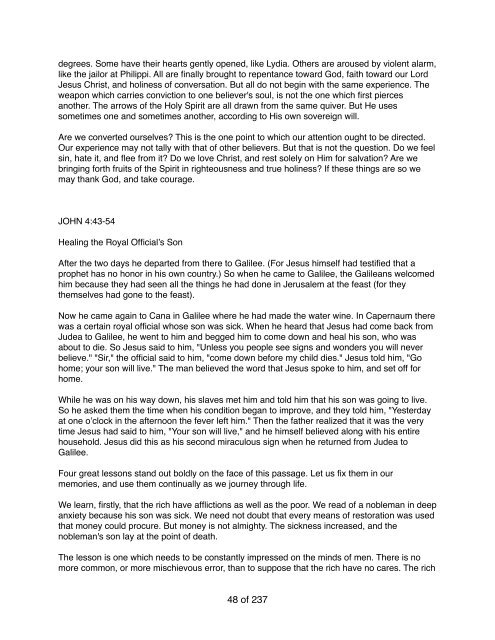J. C. Ryle John
John Charles Ryle (May 10, 1816 - June 10, 1900) was an evangelical Anglican clergyman and first Bishop of Liverpool. He was renowned for his powerful preaching and extensive tracts.
John Charles Ryle (May 10, 1816 - June 10, 1900) was an evangelical Anglican clergyman and first Bishop of Liverpool. He was renowned for his powerful preaching and extensive tracts.
You also want an ePaper? Increase the reach of your titles
YUMPU automatically turns print PDFs into web optimized ePapers that Google loves.
degrees. Some have their hearts gently opened, like Lydia. Others are aroused by violent alarm,<br />
like the jailor at Philippi. All are finally brought to repentance toward God, faith toward our Lord<br />
Jesus Christ, and holiness of conversation. But all do not begin with the same experience. The<br />
weapon which carries conviction to one believer's soul, is not the one which first pierces<br />
another. The arrows of the Holy Spirit are all drawn from the same quiver. But He uses<br />
sometimes one and sometimes another, according to His own sovereign will.<br />
Are we converted ourselves? This is the one point to which our attention ought to be directed.<br />
Our experience may not tally with that of other believers. But that is not the question. Do we feel<br />
sin, hate it, and flee from it? Do we love Christ, and rest solely on Him for salvation? Are we<br />
bringing forth fruits of the Spirit in righteousness and true holiness? If these things are so we<br />
may thank God, and take courage.<br />
JOHN 4:43-54<br />
Healing the Royal Official’s Son<br />
After the two days he departed from there to Galilee. (For Jesus himself had testified that a<br />
prophet has no honor in his own country.) So when he came to Galilee, the Galileans welcomed<br />
him because they had seen all the things he had done in Jerusalem at the feast (for they<br />
themselves had gone to the feast).<br />
Now he came again to Cana in Galilee where he had made the water wine. In Capernaum there<br />
was a certain royal official whose son was sick. When he heard that Jesus had come back from<br />
Judea to Galilee, he went to him and begged him to come down and heal his son, who was<br />
about to die. So Jesus said to him, "Unless you people see signs and wonders you will never<br />
believe." "Sir," the official said to him, "come down before my child dies." Jesus told him, "Go<br />
home; your son will live." The man believed the word that Jesus spoke to him, and set off for<br />
home.<br />
While he was on his way down, his slaves met him and told him that his son was going to live.<br />
So he asked them the time when his condition began to improve, and they told him, "Yesterday<br />
at one o’clock in the afternoon the fever left him." Then the father realized that it was the very<br />
time Jesus had said to him, "Your son will live," and he himself believed along with his entire<br />
household. Jesus did this as his second miraculous sign when he returned from Judea to<br />
Galilee.<br />
Four great lessons stand out boldly on the face of this passage. Let us fix them in our<br />
memories, and use them continually as we journey through life.<br />
We learn, firstly, that the rich have afflictions as well as the poor. We read of a nobleman in deep<br />
anxiety because his son was sick. We need not doubt that every means of restoration was used<br />
that money could procure. But money is not almighty. The sickness increased, and the<br />
nobleman's son lay at the point of death.<br />
The lesson is one which needs to be constantly impressed on the minds of men. There is no<br />
more common, or more mischievous error, than to suppose that the rich have no cares. The rich<br />
48 of 237




